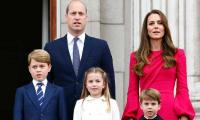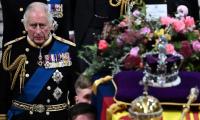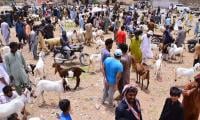ISLAMABAD: Never in Pakistan’s history has an election campaign involving such a relatively small population attracted so much attention and involved so much hectic campaigning by national leaders as the current electoral exercise in Gilgit-Baltistan (GB). The estimated total population of the area is just 1.3 million with 745,000 voters.
The Pakistan Tehreek-e-Insaf (PTI), Pakistan Muslim League-Nawaz (PML-N) and Pakistan People’s Party (PPP) are viewing the GB polls as a kind of do or die contest and are determined to place its outcome in the broader context of Pakistani politics. Every party feels that if the election is lost, it would lead to a grave loss of face in national politics because of the intensifying wider political conflict.
The high-stakes electoral exercise, which will culminate on Sunday, has become much more high profile than usual due to the participation and interest of influential politicians. But even before the ballots have been cast, allegations of rigging have been flung around by opposition stalwarts.
The mainstream political parties have never in the past paid so much attention to any general elections in GB. The first polls held in 2010 were won by the PPP when it was also in power at the federal level. The PML-N had a landslide victory in the subsequent elections organized in 2015 when it also had control of the the federal government. The canvassing for these two polls was not as vigorous and boisterous as the present campaign has been. Thankfully, despite all the sound and fury, the elections have remained peaceful so far.
As the electioneering period for the Nov 15 elections began, the major political parties suddenly decided to take a plunge to establish their electoral superiority in the area’s 33-member legislative assembly. On their campaign trail, the opposition and federal government leaders persisted with their focus on the tensions and confrontation in Pakistan’s wider politics. Thus, GB became a battleground for settling scores with each other on issues that haunt Pakistan’s wider politics.
PPP Chairman Bilawal Bhutto Zardari was the first top leader to jump into the GB arena and remained camped in the region for more than three weeks. He took the campaign very seriously and held multiple rallies in every constituency. He now has high hopes and expectations that his party will carry the day. At times, he was assisted during the campaign by other top PPP leaders including Qamar Zaman Kaira and Sherry Rehman.
PML-N Vice President Maryam Nawaz, on the other hand, started the poll campaign very late – just ten days before polling day. However, she too addressed a number of public meetings, mostly expounding the narrative of her party as well as the Pakistan Democratic Movement (PDM). Again, Maryam was accompanied on her visits to GB by other senior party leaders.
For his part, Prime Minister Imran Khan visited the area once to announce that GB will soon be given provisional provincial status. The PTI’s election campaign was mainly run by Federal Minister for Kashmir Affairs and Gilgit-Baltistan Ali Amin Gandapur, who repeatedly promised to allocate massive federal funds for the region if his party nominees were voted in. At one stage, federal cabinet members Murad Saeed and Zulfi Bukhari also joined the campaign trail.
Polling will be held for 23 seats on Sunday and for the 24th seat -- where it was postponed -- a week later. The winners will later elect nine candidates on reserved seats. Even if there is a 50 percent turnout in this chilly weather, it would mean that only 372,500 of the total 745,000 votes would be cast. Each of the 24 directly contested seats has an average of 31,000 votes. In case half of the voters exercised their right of franchise, there would be an average of 15,000 voters for every constituency. Given the heated contest expected, the margin of victory is expected to be in the mere hundreds in many cases.
The contest could be closer still considering the huge number of independents who are in the race. They comprise almost two-thirds of the total aspirants; of the 326 candidates, some 200 are independents.
Justice Tariq Mehmood Jahangiri took up Sher Afzal bail plea for hearing
CCP’s announcement made, stating that applicants are required to pay money upfront in order to enroll
According to details, the police took a van filled with female students of medical college to a police station on...
In this image, the logo of the Nowshera Press Club can be seen. — Facebook/Nowshera Press Club/FileNOWSHERA: The...
Senator Sherry Rehman said the PPP had previously extended an offer to the PTI to form a government, but the PTI is...
A division bench comprising Justice Shakeel Ahmad and Justice Dr Khurshid Iqbal heard the petition filed by the KP...







